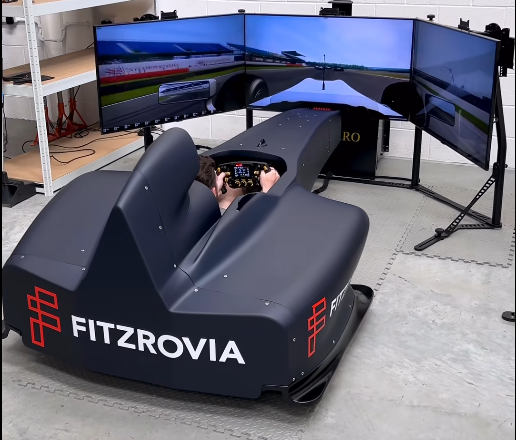
Sim racing has evolved from a niche hobby into a highly competitive esports industry and a legitimate training ground for real-world motorsport. Over the past decade, professional sim racing has grown exponentially, with drivers competing for millions of dollars in prize money, sponsorships, and even real-world racing contracts.
For aspiring professional sim racers, choosing the right platform can make or break their career. The most competitive simulators offer realistic physics, esports infrastructure, and industry recognition, allowing racers to develop skills that translate directly to real-world driving.
This article explores the top simulators pro racers use, the importance of cross-platform adaptation, and how sim racing is reshaping motorsport training.
The Big Three: Top Simulators for Professional Racing
While many racing games exist, only a handful are considered true simulators by professional drivers and teams. The three most widely used in professional sim racing are:
| Simulator | Best For | Notable Championships | Used by Real Teams? |
|---|---|---|---|
| iRacing | Online competition, esports | eNASCAR Coca-Cola iRacing Series, IMSA iRacing Pro | ✅ Yes (IndyCar, NASCAR, F1 teams) |
| Assetto Corsa Competizione (ACC) | GT3 & GT4 racing, endurance events | GT World Challenge Esports | ✅ Yes (Lamborghini, Audi, Ferrari GT teams) |
| rFactor 2 | Realistic physics, car development | Formula E, Le Mans Virtual Series | ✅ Yes (F1, WEC teams) |
Each simulator excels in a specific area, making cross-platform adaptability crucial for professional racers.
1. iRacing: The Gold Standard for Esports
Player Base: Over 220,000 active subscribers (2023)
Realism: Laser-scanned tracks, industry-leading online competition
Prize Money: eNASCAR Coca-Cola iRacing Series ($300,000 purse in 2023)
iRacing is the most competitive and structured sim racing platform, featuring:
✔ Subscription-based matchmaking with a strict skill ladder (iRating & Safety Rating)
✔ Officially sanctioned championships from NASCAR, IMSA, and IndyCar
✔ Real-world track scanning with millimeter accuracy
Real-World Impact: NASCAR driver William Byron honed his racecraft on iRacing before transitioning to real NASCAR competition. F1’s Max Verstappen also regularly competes in iRacing endurance events.
Data Insight: According to iRacing’s official stats, the platform has hosted over 4 billion laps since launch, with over 3,000 races run daily.
2. Assetto Corsa Competizione (ACC): The GT Racing Specialist
Player Base: Over 1.5 million copies sold (2023)
Realism: Advanced GT3 physics, official game of the GT World Challenge
Professional Use: Used by Lamborghini, Ferrari, and Audi factory teams
ACC is the most realistic simulator for GT3 and GT4 racing, making it the go-to training tool for professional GT drivers.
Key Features:
✔ Real-world tire physics, aerodynamics, and suspension modeling
✔ Endurance racing format with driver swaps and real-time weather conditions
✔ Used by GT teams for track familiarization and race strategy simulations
Real-World Impact: British GT champion James Baldwin won the World’s Fastest Gamer competition using ACC, securing a real-world GT3 race seat.
Data Insight: According to Kunos Simulazioni, 80% of professional GT teams use ACC for training and setup preparation.
3. rFactor 2: The Physics Powerhouse
Player Base: Smaller niche audience, primarily professional teams and leagues
Realism: Industry-best tire model, modding flexibility
Professional Use: Used by Formula E and World Endurance Championship (WEC) teams
rFactor 2 is the most physics-intensive sim, offering:
✔ Dynamic track evolution (rubber buildup, temperature changes, wet-dry conditions)
✔ Highly detailed tire wear and degradation simulation
✔ Advanced AI and modding capabilities
Real-World Impact: Formula E’s official esports championship is run on rFactor 2, with real-world Formula E drivers competing alongside sim racers.
Data Insight: rFactor 2’s tire physics are so advanced that Pirelli used its tire model for testing F1 compounds before real-world track testing.
Why Pro Sim Racers Compete on Multiple Platforms
Top sim racers often switch between platforms to:
✔ Maximize exposure and earnings across multiple esports events
✔ Adapt to different driving styles (oval, GT, open-wheel, endurance)
✔ Train for real-world motorsport opportunities
Data Insight:
In 2022, the top 10 esports sim racers competed in an average of 3 different simulators per year.
Sim racing prize pools exceeded $1.2 million in 2023, with iRacing, ACC, and rFactor 2 dominating the competitive scene.
Sim Racing as a Pathway to Real Motorsport
Jann Mardenborough – Won the GT Academy through Gran Turismo, now races in Super GT in Japan.
James Baldwin – Won World’s Fastest Gamer, securing a real-world GT3 seat.
Max Verstappen – Uses iRacing for real-world endurance race training.
Data Insight:
According to McLaren’s esports division, over 40% of modern racing teams use simulators to scout and develop young talent.
Challenges & Solutions in Professional Sim Racing
| Challenge | Solution |
|---|---|
| Over-reliance on one simulator | Train across multiple platforms |
| Inconsistent physical fitness | Regular cardio & reaction training |
| Lack of real-world racing experience | Seek test drives, karting, or real track days |
| Limited sponsorship opportunities | Build a social media presence & stream races |
The Future of Sim Racing: What’s Next?
AI-Powered Coaching – Personalized AI race engineers analyzing your telemetry in real time.
VR & Motion Platforms – Sim rigs with full motion feedback and haptic gloves for realistic car control.
Web3 & Blockchain Racing – NFT-based car ownership and crypto-backed esports prize pools.
Data Projection:
By 2027, the sim racing industry is expected to exceed $5 billion, with esports prize pools growing 20% year-over-year.
The number of professional sim racers transitioning to real motorsport is expected to double in the next five years.
Final Thoughts
iRacing = Best for esports & online competition
ACC = Best for GT3/GT4 racing & endurance events
rFactor 2 = Best for realistic physics & professional team development
Sim racing is no longer just a hobby—it’s a legitimate career path, a motorsport training tool, and one of the fastest-growing esports in the world.
Are you ready to take your sim racing career to the next level?
